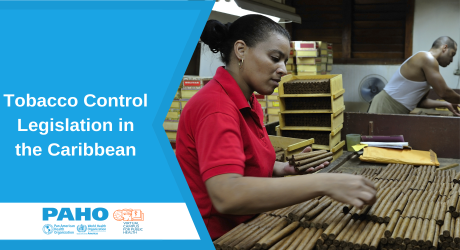Developing Tobacco Control Legislation in the Caribbean - 2021

Introduction
Tobacco use and exposure to secondhand smoke cause a wide range of diseases with devastating public health impacts in addition to enormous social, economic, and environmental harm. Fortunately, many cost-effective, scientifically-based strategies and measures to combat this global epidemic have already been tested in various countries with significant success. These strategies and measures are included in the World Health Organization’s Framework Convention on Tobacco Control (WHO FCTC), which has been in force internationally since 2005. It is a legally binding international treaty that requires Parties to adopt and implement effective legislation and enforceable measures for preventing and reducing tobacco consumption, nicotine addiction, and exposure to tobacco smoke.
In the Caribbean, all PAHO/WHO Member States are Parties to the WHO FCTC, except for Haiti. However, the implementation of effective tobacco control measures has been slow across the subregion. From a regional perspective, CARICOM still lags behind. Three of the eight countries that have fully implemented three of the four WHO “best buys” for tobacco control in Latin America and the Caribbean are from CARICOM (Antigua and Barbuda, Guyana, and Suriname); however, seven of the fourteen CARICOM countries have not adopted a single best buy (Bahamas, Belize, Dominica, Grenada, Haiti, Saint Kitts, and Nevis and Saint Vincent and the Grenadines).
This lack of progress is particularly worrisome since compared to other subregions of the Americas, people in the Caribbean have the highest probability of dying prematurely from non-communicable diseases (NCDs).
Purpose of the course:
The course aims to enhance capacity for the development of tobacco control legislation consistent with the mandates of the WHO FCTC and the recommendations of its guidelines for implementation, taking into account Caribbean legislative contexts.
Course Objectives:
-
To build participants’ capacity for drafting effective tobacco control measures, consistent with the mandates of the WHO FCTC and the recommendations of its guidelines and considering the Caribbean Context;
-
To improve participants’ understanding of the tobacco epidemic and its economic, social, and environmental impacts, globally, regionally, and in the Caribbean;
-
To familiarize participants with key international legal frameworks, mandates, and accountability mechanisms, including the WHO FCTC and its guidelines, as well as international human rights frameworks;
-
To enhance participants’ understanding of the rationale, evidence-based, and status of implementation of WHO FCTC measures, with a focus on the MPOWER technical package; and
-
To strengthen participant’s ability to counter-strategies against effective tobacco control measures, including tobacco industry arguments and potential legal challenges.
Course structure:
There are 8 modules to complete, which include:
- Module 1: The Tobacco Epidemic and Status of Tobacco Control;
- Module 2: Developing Tobacco Control Legislation;
- Module 3: Protection from Exposure to Tobacco Smoke;
- Module 4: Packaging and Labelling of Tobacco Products;
- Module 5: Tobacco Advertising, Promotion, and Sponsorship;
- Module 6: Other measures;
- Module 7: New and Novel Products
- Module 8: Protecting Tobacco Control Policies from the Commercial and Other Vested Interests of the Tobacco Industry
Modality:
The course will be delivered synchronously, incorporating learning activities and practice sessions in groups during the live sessions. It will also include asynchronous quizzes, assignments, and a final exam.
Audience:
Government officials from the English-speaking Caribbean who are actively involved in the process of developing and implementing legislation, notably tobacco control legislation.
